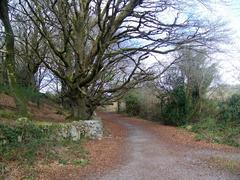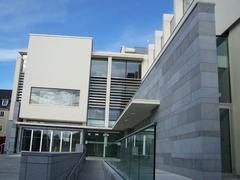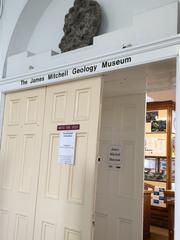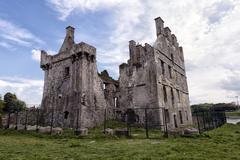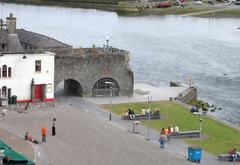Blake’s Castle Visiting Hours, Tickets, and Guide to Galway Historical Sites
Date: 03/07/2025
Introduction to Blake’s Castle and Its Historical Significance
Menlo Castle, also known as Blake’s Castle or Menlough Castle, stands as one of the most atmospheric historical landmarks near Galway city, encapsulating centuries of Irish history, architectural transformation, and cultural significance. Located on the tranquil banks of the River Corrib near Menlo village, just outside Galway, the castle offers fascinating insights into the influential Blake family — one of the renowned “Tribes of Galway” — whose presence shaped the region’s social and economic landscape for over three centuries. Originally erected as a fortified tower house around 1569, Menlo Castle later incorporated Georgian and Jacobean elements, reflecting both the defensive needs and the rising prosperity of the Blakes (Wikipedia: Menlo Castle; Oi.ie; Audiala).
Today, visitors are captivated by the castle’s ivy-clad ruins and scenic riverside setting, as well as its poignant past — marked by both grandeur and tragedy, especially the devastating fire of July 26, 1910, which ended the Blake family’s residence and left a deep imprint on local memory (Galway Advertiser; ItsOn.ie). Although the castle interior is closed for safety and preservation, the grounds are accessible year-round for those seeking scenic walks, unique photographs, and connections to other Galway landmarks such as Lynch’s Castle, the Spanish Arch, and Galway City Walls (Galway Historical Sites; Wikipedia: Menlo Castle). Guided tours and occasional cultural events provide further insights, while local folklore weaves tales of supernatural happenings into the site’s narrative (This is Galway).
Complementing Menlo Castle is Blake’s Castle in Galway city center, a 15th-century urban tower house built by the Blakes. Though generally closed to the public, its well-preserved exterior near the Spanish Arch offers a tangible link to Galway’s medieval past and the merchant families that shaped it (Galway City Museum; Galway Tourism).
This guide delivers comprehensive information about Menlo Castle and Blake’s Castle, including visiting hours, ticketing, accessibility, historical context, architectural highlights, and travel tips — ideal for history enthusiasts and casual visitors alike (Audiala; Wikipedia: Menlo Castle).
Contents Overview
- Discover Menlo Castle: Visiting Hours, Tickets, and History
- Menlo Castle Visiting Hours and Tickets
- Accessibility and Travel Tips
- Nearby Attractions and Photographic Spots
- Early Origins and Construction
- The Blake Family and Their Legacy
- Architectural Features
- The 1910 Fire: Tragedy and Ruin
- Aftermath and Decline
- Modern Era: Preservation and Public Access
- The Blake-Forster Connection
- Menlo Castle History and Visiting Guide: Tragic Fire of 1910 and Visitor Information
- Overview, History, and Visitor Details
- The Tragic Fire of 1910: Events and Eyewitness Accounts
- Practical Visitor Info, Nearby Attractions, and Tips
- FAQ
- Menlo Castle: A Historic Galway Gem – Visiting Hours, Tickets & Heritage Guide
- The Blake Family and the Tribes of Galway
- Architectural Evolution and Symbolism
- Social and Cultural Life at Menlo Castle
- The Tragic Fire of 1910 and Its Aftermath
- Visiting Menlo Castle: Hours, Tickets & Accessibility
- Nearby Attractions and Guided Tours
- Folklore, Memory, and Local Identity
- Conservation, Urban Exploration, and Contemporary Significance
- Menlo Castle in the Context of Irish Heritage
- FAQ
- Visiting Blake’s Castle Today: Your Guide to Blake’s Castle Visiting Hours, Tickets, and Galway Historical Sites
- Location and Setting
- Historical Background and Features
- Visiting Hours, Tickets, and Access
- What to See and Do
- Visual and Media Resources
- Practical Visitor Tips
- Cultural and Historical Significance
- FAQ
- Additional Resources
Discover Menlo Castle: Visiting Hours, Tickets, and History
Menlo Castle Visiting Hours and Tickets
- Opening Hours: The castle grounds are accessible daily, typically from 9:00 AM to 6:00 PM.
- Admission: Free entry; no ticket required, as the site is maintained by Galway City Council.
- Facilities: There are no official visitor amenities on-site; plan accordingly.
- Guided Tours: Occasionally available via local historical societies or tour operators; check with Galway Tourism for updates.
Accessibility and Travel Tips
- Access: Reachable via a small road off the R336. Parking is limited; consider public transport, cycling, or taxis from Galway city.
- Mobility: The ruins are not fully wheelchair accessible due to uneven terrain and lack of developed paths.
Nearby Attractions and Photographic Spots
- Best Viewing: The opposite bank of the River Corrib, especially from the National University of Ireland, Galway campus.
- Nearby Sites: Lynch’s Castle, the Spanish Arch, Galway City Walls, and Claddagh Village — each deepening your experience of Galway’s layered history.
Early Origins and Construction
Menlo Castle (Irish: Caisleán Mhionlaigh) dates to the mid-16th century, with the earliest known occupant being Thomas Colman in 1574. Its original tower house design typified the defensive residences of the Anglo-Norman and Gaelic elite (Wikipedia: Menlo Castle).
The Blake Family and Their Legacy
As one of Galway’s “Tribes,” the Blakes owned Menlo Castle for centuries, expanding it in the 18th century with new residential blocks and a turret — reflecting their wealth and status (oi.ie). The castle was renowned for hospitality, hosting the celebrated “May in Menlo” festival that drew crowds for music, dance, and sports.
Architectural Features
Menlo Castle combines its original defensive features — thick stone walls, narrow slit windows — with Georgian expansions that emphasized comfort and grandeur. The square turret at the eastern end remains a distinctive element (Wikipedia: Menlo Castle).
The 1910 Fire: Tragedy and Ruin
On July 26, 1910, while Sir Valentine and Lady Blake were away, a catastrophic fire broke out, claiming the lives of two maids and the Blakes’ disabled daughter Eleanor (oi.ie). The blaze destroyed the interior and ended the family’s long association with the castle.
Aftermath and Decline
Following the fire, the castle was abandoned. In 1923, the Land Commission divided the estate as part of wider land reforms (Wikipedia: Menlo Castle). The ruins now stand as a reminder of the Blake family’s influence and the changing fortunes of Ireland’s gentry.
Modern Era: Preservation and Public Access
Galway City Council acquired the site in 2000. There are no visitor facilities, but the castle remains popular for photography, picnics, and quiet riverside walks (Wikipedia: Menlo Castle).
The Blake-Forster Connection
The Blakes’ intermarriage with the Forster family produced the Blake-Forster lineage, further entrenching their influence in Galway’s social and political spheres (Patrick Comerford’s Journal).
Frequently Asked Questions (FAQ)
- Q: What are the visiting hours?
A: Grounds are open daily, generally from 9:00 AM to 6:00 PM. - Q: Are tickets required?
A: No, admission is free. - Q: Is the castle wheelchair accessible?
A: The terrain is uneven; access is limited for mobility-impaired visitors. - Q: Are guided tours available?
A: Occasionally, through local tour operators. Check with Galway Tourism. - Q: Is Menlo Castle open year-round?
A: Yes, but visit during daylight hours for safety.
Menlo Castle History and Visiting Guide: Tragic Fire of 1910 and Visitor Information
Overview
Menlo Castle is a striking 16th-century monument on the River Corrib, expanded into a Jacobean mansion and home to the Blake family from the early 1600s. Its picturesque setting and tragic history make it a key Galway heritage site.
The Tragic Fire of 1910
On July 26, 1910, a fire broke out while the Blakes were away. Their daughter Ellen Blake and two staff members were trapped; only one survived. Eyewitness accounts describe desperate escape attempts and unsuccessful rescues (Galway Advertiser).
Visitor Information
- Hours: Open daily, 9:00 AM–6:00 PM.
- Tickets: Free entry; donations for preservation are welcome.
- Guided Tours: Available on weekends or by appointment.
- Accessibility: Terrain is uneven; limited wheelchair access.
Nearby Attractions
Enhance your visit by exploring the Galway City Museum, Eyre Square, and the Spanish Arch — each providing further context for Galway’s rich history.
Tips
- Wear sturdy shoes.
- Bring a camera for riverside and castle views.
- Check weather in advance — the site is outdoors.
FAQ
- Are guided tours available?
Yes, on weekends or by prior arrangement. - Is there an entrance fee?
No, but donations are encouraged. - Best time to visit?
Spring and summer. - Is the site accessible?
Limited accessibility; contact the visitor center for details.
Menlo Castle: A Historic Galway Gem
Explore Menlo Castle’s story — from its 16th-century origins through centuries of Blake family residence, to the tragic 1910 fire and modern conservation efforts. The castle’s position along the River Corrib, architectural blend of defensive and stately home features, and role as a social and cultural hub all contribute to its enduring appeal (Visit Galway; Audiala; This is Galway).
The Blake Family and the Tribes of Galway
The Blakes, one of the “Fourteen Tribes of Galway,” were key figures in the city’s economic and social development. Their stewardship of Menlo Castle spanned over 300 years, marked by hospitality, tradition, and community leadership.
Architectural Evolution
Menlo Castle evolved from a fortified tower house to a stately Jacobean mansion, symbolizing the Blakes’ rising fortunes and the broader shift among Irish gentry from defense to comfort and display.
Social Life and Folklore
The annual “Maying in Menlo” festival was a highlight, drawing locals for celebrations that underscored the Blakes’ community role. Folklore, including tales of faeries and the haunting story of Eleanor Blake, continues to enrich the site’s mystique (This is Galway).
Conservation and Contemporary Significance
Today, Menlo Castle is a favored subject for photographers and urban explorers. Conservation debates continue, especially after recent storm damage (Audiala; Galway Tourism). The castle’s enduring appeal lies in its evocative ruins, riverside walks, and connections to Galway’s living heritage.
FAQ
- Can I enter Menlo Castle?
No, interior access is restricted. Enjoy views from public areas or guided boat tours. - Are there tours?
Yes, several local operators include Menlo Castle in their itineraries. - Is there a fee?
No fee for viewing from public areas; tour fees may apply. - Best time to visit?
Spring and summer.
Visiting Blake’s Castle Today: Your Guide to Blake’s Castle Visiting Hours, Tickets, and Galway Historical Sites
Location and Setting
Blake’s Castle is centrally located at the mouth of the River Corrib, near Quay Street and the Spanish Arch in Galway city — a hub of medieval history and modern vibrancy (Galway Tourism).
Historical Background
Dating to the 15th century and built by the Blake family, the castle is among the city’s last remaining medieval structures, originally constructed to defend the quays and control river access (Galway City Museum).
Architectural Features
- Robust limestone walls, arrow slits, and defensive loopholes
- Vaulted ground floor with stone ceiling
- Remains of battlements and later commercial adaptations from its use as a warehouse
Visiting Information
- Exterior Viewing: Free and accessible at any time from the street.
- Interior Access: Not generally open to the public, except during special heritage events or by arrangement.
- Guided Tours: Many walking tours of Galway’s medieval quarter include the castle’s exterior; some may offer interior access during events (Galway Walking Tours).
What to See
- Admire the stonework and defensive features
- Read interpretive plaques about the Blakes and Galway’s medieval past
- Explore nearby Spanish Arch and Galway City Museum
Practical Tips
- Best accessed on foot from Eyre Square or by public transport
- Plan visits during Galway’s festivals for added vibrancy
- Dress for changeable weather
FAQ
- Visiting hours?
Exterior is viewable at any time; interior access is rare. - Entry fee?
None for exterior viewing. - Can I enter the castle?
Only during special events or by arranged tour. - Are guided tours available?
Yes, several local companies provide walking tours with historical context.
Summary of Key Points and Visitor Tips
Menlo Castle and Blake’s Castle together embody Galway’s layered history and cultural identity. Menlo Castle’s evocative riverside ruins and the tragic 1910 fire reflect Ireland’s shifting fortunes and the Blake family’s enduring legacy (Oi.ie; ItsOn.ie). Although interior access is restricted, riverside walks and nearby historical sites offer rewarding experiences.
Blake’s Castle in the heart of Galway city provides a glimpse into urban medieval life and the merchant tradition of the Tribes of Galway (Galway City Museum; Galway Tourism). Both sites highlight the rise and fall of Ireland’s gentry, the blending of cultures, and the power of memory and folklore.
For a richer visit, join guided tours, use audio guide apps such as Audiala, and plan your trip for spring or summer. Prepare for uneven terrain at Menlo Castle, and use public transport for convenience.
Sources and Official Links
- Wikipedia: Menlo Castle
- Oi.ie: Menlo Castle
- Patrick Comerford’s Journal
- ItsOn.ie: The Tragic Fire That Doomed Menlo Castle
- Galway Tourism
- This is Galway: The History of Menlo Castle
- Galway City Museum
- Audiala: Menlo Castle Guide
- Galway Walking Tours
- Heritage Ireland – Galway
Experience the legacy, tragedy, and beauty of Galway’s most storied castles. For updates, audio guides, and special events, download the Audiala app and follow Galway’s heritage organizations.
